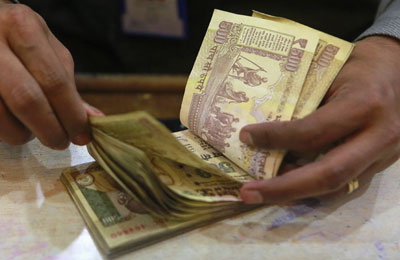
Rupee hits new low; stocks plunge
New Delhi, August 27, 2013
The Indian rupee hit a record low and posted its biggest percentage fall in 18 years on Tuesday after parliament's approval of a $20 billion plan to provide cheap grain to the poor renewed doubts about government resolve to control spending ahead of elections due next year.
The partially convertible rupee slumped to a record low of 66.30 to the dollar, despite central bank intervention to ease the pace of the decline, surpassing its previous all-time low of 65.56 hit last Thursday.
The currency fell 2.9 percent on the day to close at 66.24/25, its biggest single-day percentage fall since October 1995 according to Thomson Reuters data and its biggest fall ever in absolute terms.
Shares also slumped, sending the benchmark BSE index down more than 3 percent and benchmark 10-year bond yields up 44 basis points.
The alarm over India's fiscal deficit eclipsed an announcement by Finance Minister P Chidambaram that the government had approved infrastructure projects worth 1.83 trillion rupees ($28.38 billion), a step aimed at reviving economic growth and shoring up investor confidence.
Instead, the rupee plumbed new depths while shares plunged after Chidambaram spoke as his promise that the government will meet its fiscal deficit target failed to turn sentiment.
"I have already said that 4.8 percent of GDP and the absolute number that was indicated in the budget is a red line. The red line will not be breached," Chidambaram told a news conference. "I think we'll simply have to be patient, be firm, do whatever is required to be done, and the rupee will find its appropriate level."
Traders said the currency market was working in a climate of fear as repeated efforts by authorities to turn the markets around failed to have a holding impact.
The rupee has lost 17 percent against the dollar so far this year - making it the worst performer by far among Asian emerging market currencies tracked by Reuters - despite frantic attempts by the government and central bank to support it and repeated comments by the finance minister that the rupee is oversold.
Indian markets have been caught in a downward spiral since May as the prospect for a tapering off in the Federal Reserve's period of cheap money exposes India's vulnerability among emerging markets - marked by a record high current account deficit, a troubling fiscal deficit and the weakest economic growth in a decade.
Yet, despite measures to address these concerns, including a slew of steps to attract dollar inflows, Indian policymakers are struggling to instil confidence.
"It's not out of choice, but out of compulsion that the finance minister is announcing so many things," said G. Chokkalingam, managing director and chief investment officer of Centrum Wealth Management in Mumbai.
"The trinity of the fiscal deficit, slowing growth and an unstable currency is hitting us badly. In addition to these, the government has passed the food security bill which may put fear in the mind of rating agencies."
The 1.35 trillion rupees ($20.94 billion) Food Security Bill is a key part of the ruling Congress party's strategy to win re-election, with its focus on selling subsidised wheat and rice to 67 percent of India's population of 1.2 billion.
Kotak Institutional Equities said there would be "no free lunch", estimating India's subsidy burden would reach 827 billion rupees from the budgeted 606 billion rupees.
Chidambaram sought to address concerns about the economic slowdown by pledging to kickstart 36 stalled projects in sectors ranging from oil, gas and power to roads and railways.
"The message that we are sending is that the investment cycle has restarted, and we are pushing it. It is gathering pace," he said.
However, analysts say these projects will not take off quickly, while the government has little to show from recent economic reforms.
Its move last year to allow foreign investment in the retail sector has yet to attract a proposal, though its liberalisation of the aviation industry has yielded investment plans from Malaysia's AirAsia and Abu Dhabi's Etihad Airways. - Reuters







